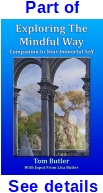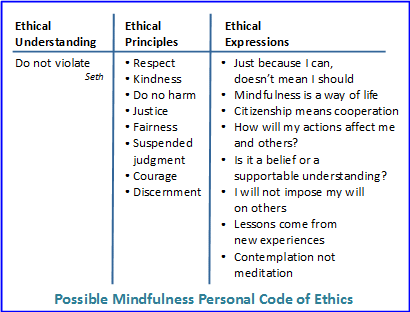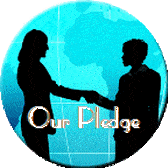Updated
Also see The Mindful Way.
I recommend the books:
Your Immortal Self: exploring the mindful way
Exploring the Mindful Way.
Introduction
 The National Spiritualist Association of Churches (NSAC) Declaration of Principles functions as an outline for a personal ethics code based on the understanding that our “… existence and personal identity continue after the change called death” (Principle 4). When it comes to ethics in daily living, the personal responsibility described in Principle 7 sets the tone for the highest standard of right living. It reads: “We affirm the moral responsibility of individuals and that we make our own happiness or unhappiness as we obey or disobey Nature’s physical and spiritual laws.” (See nsac.org under the Spiritualism Tab for more on this)
The National Spiritualist Association of Churches (NSAC) Declaration of Principles functions as an outline for a personal ethics code based on the understanding that our “… existence and personal identity continue after the change called death” (Principle 4). When it comes to ethics in daily living, the personal responsibility described in Principle 7 sets the tone for the highest standard of right living. It reads: “We affirm the moral responsibility of individuals and that we make our own happiness or unhappiness as we obey or disobey Nature’s physical and spiritual laws.” (See nsac.org under the Spiritualism Tab for more on this)
The simplest understanding to come from Principle 7 is first that we are responsible for our actions. And second, we benefit from understanding and living in accordance with the principles governing the operation of Nature. But how do we do the work to understand those organizing principles?
The Mindful Way represents techniques intended to help a person learn to be present in everyday life. The idea is to become aware of our actions by habitually questioning what we do and why. The Mindful Way is a powerful way of coming to understand Natural Law and teaches our mostly unconscious mind to replace belief in our worldview with beneficial understanding. It is our worldview that informs our mostly automatic responses to daily living. (1)
Morality Versus Ethics
Virtually all the definitions of morality and ethics I have found are based on a body-centric perspective with no consideration of our immortality. To make my point, I have taken something of a backdoor approach by including reference to two different philosophical essays:
Morality
“The Definition of Morality” by Bernard and Joshua Gert provides an excellent discussion of morality and ethics. The authors suggest that one of two dominant perspectives on morality might be taken by theorist: (2)
- Descriptively to refer to certain codes of conduct put forward by a society or a group (such as a religion), or accepted by an individual for her own behavior, or
- Normatively to refer to a code of conduct that, given specified conditions, would be put forward by all rational persons.
The authors propose that: “If one uses ‘morality’ in its descriptive sense, (Perspective 1) and therefore uses it to refer to codes of conduct actually put forward by distinct groups or societies, one will almost certainly deny that there is a universal morality that applies to all human beings.”
They explain that: “Those who use ‘morality’ normatively (Perspective 2) hold that morality is (or would be) the code that meets the following condition: all rational persons, under certain specified conditions, would endorse it.” And later in the essay, “… “virtually all hold that ‘morality’ refers to a code of conduct that applies to all who can understand it and can govern their behavior by it, …”
Ethics
“Aristotle’s Ethics” by Richard Kraut includes this overview of Aristotle’s point of view about ethics in the Preamble to the essay. In part: (3)
Aristotle follows Socrates and Plato in taking the virtues to be central to a well-lived life. Like Plato, he regards the ethical virtues (justice, courage, temperance and so on) as complex rational, emotional and social skills.… What we need, in order to live well, is a proper appreciation of the way in which such goods as friendship, pleasure, virtue, honor and wealth fit together as a whole. In order to apply that general understanding to particular cases, we must acquire, through proper upbringing and habits, the ability to see, on each occasion, which course of action is best supported by reasons.
Therefore, practical wisdom, as he conceives it, cannot be acquired solely by learning general rules. We must also acquire, through practice, those deliberative, emotional and social skills that enable us to put our general understanding of well-being into practice in ways that are suitable to each occasion.
Consider this about Aristotle’s philosophy from the perspective of our immortality and the idea of a cooperative community.
Kraut concludes his essay with:
(Based on Aristotle’s writing) … Human beings cannot achieve happiness, or even something that approximates happiness, unless they live in communities that foster good habits and provide the basic equipment of a well-lived life.
The study of the human good has therefore led to two conclusions: The best life is not to be found in the practice of politics. But the wellbeing of whole communities depends on the willingness of some to lead a second-best life—a life devoted to the study and practice of the art of politics, and to the expression of those qualities of thought and passion that exhibit our rational self-mastery.
Both terms have very similar meaning, but in practical use by contemporary society, morality is most often defined in terms of what the organization expects of its members. This could be a religious moral code, a corporate code of conduct or an institutional one such as the expected behavior of college students. Even when a code includes references to ethics, the code virtually always requires compliance with social norms which are typically described in terms of morality.
The point of view suggested by the Trans-Survival Hypothesis (4) (5) is that we are immortal self and must not be governed solely by cultural (local) norms. If we succumb to behaving according to what is socially right, rather than what is spiritually right, we effectively abdicate our responsibility to seek spiritual maturity (progression, lucidity).
The more universal meaning of right and wrong is expressed in terms of ethical behavior. Ethical also has less burden of meaning from religions and is used less for social engineering. Thus, the definitions I use here are:
Morality is defined here as a distinction between right and wrong based on local standards of behavior.
Ethics is defined here as a distinction between right and wrong; based on the organizing principles governing reality (Natural Law).
Learning to recognize and understand the universal principles that moderate the organization of reality is an important part of the Mindful Way. It is easy enough to ignore those principles in the short term but learning to habitually live in agreement with them is the path of least resistance toward spiritual maturity.
First Ethical Consideration – Do Not Violate
If you look around the Internet for codes of ethics, you will see that most are really a hybrid of business practices and service promises. They concern ethics from a corporate perspective, but in terms of a personal code, they are much too general.
Useful guidance in ethical conduct came from Jane Roberts’ Seth reguarding how a person should interact with others. The advice is simply that “Thou shalt not violate….” (6) Seth went on to explain what he intended by violate:
An outright lie may or may not be a violation. A sex act may or may not be a violation. A scientific expedition may or may not be a violation. Not going to church on Sunday is not a violation. Having normal aggressive thoughts is not a violation. Doing violence to your body, or another’s, is a violation. Doing violence to the spirit of another is a violation, but again, because you are conscious beings the interpretations are yours. Swearing is not a violation. If you believe that it is then in your mind it becomes one.
Killing another human being is a violation. Killing while protecting your own body from death at the hands of another through immediate contact is a violation. Whether or not any justification seems apparent, the violation exists.
Seth explained that there are ways to deal with situations that do not involve killing. He also suggested that “You would not be in such a hypothetical situation to begin with unless violent thoughts of your own, faced or unfaced, had attracted it to you.”
As for the Golden Rule, in Jane Roberts’ The Individual and the Nature of Mass Events, session 852, Seth says, “When you are discussing the nature of good and bad, you are on tricky ground indeed, for many—or most—of man’s atrocities to man have been committed in misguided pursuit of ‘the good’.”
Use discernment here. Of the thousands of channeled documents, the Jane Robert’s Seth material is the only material I am aware of that has been analyzed for consistency. “The Content-Source Problem in Modern Mediumship Research” 2012 article by Paul Cunningham indicates reports a strong indication that a second personality was a source of the material. (7) The majority of channeled material is clearly hyperlucid confusion rather than actual channeling.
Ethical Treatment of Human Research Subject
The Belmont Report published by the U.S. Department of Health and Human Services (8) gives us another measure of ethics. It appears to be the golden standard for research ethics involving a human subject. The major points from the Belmont Report are that researchers must respect the person, do no harm to the person (beneficence) and provide due benefits to the person (justice). These three points provide guidance on how to define basic ethical principles.
I discuss the question of ethics in research in more detail in Arrogance of Scientific Authority.
A Useful Code of Ethics
Here is a suggestion for a universal code of ethics. It should be useful for anyone and any level of society. The idea is to stay with a foundation ethical concept for Tier 1 which sets the tone for the code. Seth’s Do not violate is an excellent foundation concept.
Tier 2 is concerned with reasonably basic principles which complement or further define Do not violate. These should be intuitively obvious in the context of your personal progression. Select terms that first come to mind when you stop to consider the implications of what you are doing. For instance, Respect is short for “Am I respecting … ?” Suspended judgment is short for “Am I unnecessarily locking in a decision?”
Tier 3 is concerned with how Tier 1 and 2 are expressed. Expressions include phrases intended to provide guidance for how to live by the Organizing Principles. (9) Catchy phrases are useful here, as they make it easier to remember the principles.
You will likely want to add Principles and Expressions as you become used to working with the code. Be careful not to overcomplicate it, though. It is important that you can remember the elements so as to apply them as warranted.

Ethical Conduct is a Lifelong Learning Experience
Learning to live by a personal ethical code often means realigning our unconscious mind away from our human avatar’s survival instincts and cultural dogma we have been conditioned with over the years. Such a change in consciousness takes time and attention which comes through experience.
Remember that your conscious expression is first formed in your mostly unconscious mind. (10) That means you have relatively little control of your first response to situations. The control you do have is before the event by consistently intending to act in a mindful way. A feedback expression to yourself after the event, expressing how to be more mindful in a specific way, helps to reinforce your intended behavior message to your mind. Yes, talk to yourself.
The process of managing expectations of those you share time with, in friendship or service, provides opportunities to explore the Mindful Way. Unspoken questions and concerns can quickly cast a shadow over a relationship. An Expression for the Principle of Kindness might be “Citizenship means cooperation” or “How will my actions affect me and others?” In practice, these translate into making sure people know what to expect from you.
Above all, think of a personal code of ethics as a lifelong way of learning. It is unlikely any of us are able to always live up to the ideas represented by a code of ethics. The most important thing is to set our intention to apply the code to our every action. Every step of a journey is as important as every other step.
References
- Butler, Tom. “Mindful Way.” Etheric Studies. 2014. ethericstudies.org/mindfulness/.
- Gert, Bernard and Gert, Joshua, “The Definition of Morality”, The Stanford Encyclopedia of Philosophy (Fall 2017 Edition), Edward N. Zalta (ed.), https://plato.stanford.edu/archives/fall2017/entries/morality-definition/.
- Kraut, Richard. “Aristotle’s Ethics.” The Stanford Encyclopedia of Philosophy. 2001, revised 2014. plato.stanford.edu/archives/fall2017/entries/aristotle-ethics/.
- Butler, Tom. Your Immortal Self, Exploring the Mindful Way. AA-EVP Publishing. 2016. ISBN 978-0-9727493-8-1. ethericstudies.org/books-tom-butler/.
- Butler, Tom. “Trans-Survival Hypothesis.” Etheric Studies. 2015. ethericstudies.org/trans-survival-hypothesis.
- Roberts, Jane. The Nature of Personal Reality. Amber-Allen Publishing and New World Library. San Rafael, Novato. 1974. ISBN 1-878424-06-8
- Cunningham, Paul F. “The Content-Source Problem in Modern Mediumship Research.” Rivier University, Department of Psychology. The Journal of Parapsychology, 76(2), 295-319., 2012. rivier.edu/faculty/pcunningham/Publications/CunninghamJP_Fall-2012-Vol-76-(2)-295-319.pdf.
- “The Belmont Report.” The National Commission for the Protection of Human Subjects of Biomedical and Behavioral Research. 1979. U.S. Department of Health and Human Services. hhs.gov/ohrp/humansubjects/guidance/belmont.html.
- Butler, Tom. “Organizing Principles.” Etheric Studies. 2015. ethericstudies.org/organizing-principles/.
- Butler, Tom. “How We Think.” Etheric Studies. 2014. ethericstudies.org/how-we-think/.
![]()

